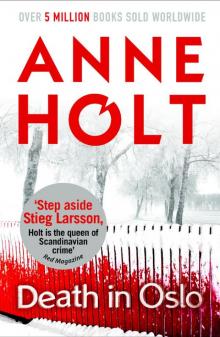What is Mine Read online
Page 8
“He’s given the child a dog,” she groaned, logging off abruptly.
When she got into the car just after nine, she felt resigned. She had been away from home for just over twenty-four hours and Isak had bought a dog. Kristiane would insist on keeping the animal with her in the weeks when she stayed with Johanne. And Johanne had absolutely no desire to have a dog.
Isak could at least have asked.
Her irritation had in no way subsided. She followed Route 28 along the coast. It wove its way from small town to small town, with sudden vistas of Nantucket Sound beyond the marinas and river mist. The sun hurt her eyes. She stopped at a garish tourist shop to buy a pair of cheap sunglasses. She’d left her own prescription sunglasses at home in Norway, so she had to choose between seeing very badly without lenses or being blinded by the sharp light. The store clerk tried to tempt her to buy a cowboy hat—as if there had ever been a cowboy within a mile of Yarmouth, Massachusetts. She eventually gave in. Thirty dollars straight into the garbage, literally. She hoped that he wouldn’t see her stuffing the hat into a green trash can. The man didn’t have a right leg; he had presumably been nineteen and a private in 1972.
Mid-Cape Highway would have been a more sensible choice in every way, a four-lane road that divided the peninsula down the middle. She suspected that she’d chosen the coastal road to delay her arrival. Yesterday she had smiled at her impetuousness. Today it was no longer funny.
There seemed to be something wrong with the gearshift.
What should she say?
Isak could have made a mistake. He’d put his hand on his heart and opened his eyes wide when she asked him for guarantees. There must be more than one person named Aksel Seier. Perhaps not that many, but some at least. Isak might have gotten it wrong. Aksel Seier of Harwich Port had perhaps never lived in Oslo. Maybe he had never been in prison either. Maybe he had been in prison, but didn’t want to be reminded. He might have a family. A wife, children, grandchildren who knew nothing about paterfamilias’s past behind lock and key. It wasn’t fair just to rip open old wounds. It wasn’t fair to Aksel Seier. Yesterday she had smiled at her impulsiveness. Today she realized that this trip to the U.S.—like her search for the truth—was a way of getting away from something. Nothing serious, she quickly reassured herself. It was not about escaping. America was where she felt most herself and that was why she’d come. She was just a bit uncertain about what she needed a break from.
By the time she reached Dennis Port, just over a mile from the address that was tucked in her wallet behind the photo of Kristiane, she had decided to turn around. She could call it a wild goose chase. Alvhild Sofienberg would understand. Johanne couldn’t do any more. She would continue her research without Aksel Seier. His case was not vital to her. She had plenty of other cases to choose from, cases where the people in question lived only a trip on the metro away from the office, or a short flight to Tromsø.
The gearshift made a horrible scraping noise.
She kept on driving.
Maybe she could just take a look at his house. She didn’t need to make contact. As she had come this far, it would be good just to get an impression of where Aksel Seier had gone in life. A house and a garden and maybe a car might tell a story that was worth knowing, having come this far.
Aksel Seier lived at 1 Ocean Avenue.
The house was easy to find. It was small. Like all the other houses around it, it was clad with cedar, gray with age, weathered and typical of the area. The windowsills were blue. On the roof, a weathercock reluctantly faced the wind. A stocky man was struggling with a ladder by the east wall. It wasn’t lunchtime yet, but Johanne felt hungry anyway.
Aksel Seier had to get a new ladder. He needed to get up on the roof. Some rungs were missing from the old ladder and it creaked alarmingly. But he had to get up there. The weathercock kept getting stuck. Aksel was sometimes woken up at night by the wind forcing the stubborn bird around; it screeched when the wind came from the southeast.
“Hi, Aksel. Pretty thing you’ve got there!”
A younger man in a plaid flannel shirt was leaning against the fence, laughing. Aksel nodded briefly at his neighbor and held the pig up in front of him. He tilted his head and shrugged his shoulders.
“Kind of original, I guess. I like it.”
The pig was made of oxidized copper, a slim pig that stood guard over the four crossed arrows that marked out each point of the compass. Aksel Seier had gotten the weather vane in exchange for some colorful net markers. The glass floats had water in them and couldn’t be used, but were still valuable as souvenirs.
“Help me with this ladder, will you?”
Matt Delaware was seriously overweight. Aksel hoped that the younger man would not offer to switch the cock for the pig for him. They finally managed to get the ladder in place.
“I would have helped you, you know. But . . .”
Matt looked at the ladder. He slapped one of the rungs lightly and pulled his baseball cap around. Aksel grunted. He carefully placed his foot on the first rung. It held. Slowly he climbed to the top. The weathercock was so rusty that it broke when Aksel tried to unscrew it. The fixture was still fine though. The pig was easily tamed by the wind and it took a matter of minutes to adjust the arrows to the points of the compass.
“Awesome,” grinned Matt, staring up at the pig. “Just awesome, you know!”
Aksel mumbled his thanks. Matt put the ladder back in its place. Aksel heard him chuckling long after he was out of sight, around the corner on the way to the O’Connors, who hadn’t opened their house for the summer yet.
Someone had parked on Ocean Avenue. Aksel glanced idly over at the Ford. There was a woman sitting alone inside the car. You weren’t allowed to leave cars here. She would have to use the parking lot on Atlantic Avenue, like all the other visitors. She didn’t come from around here. That was obvious, without him really knowing why. The summer season was hell. City folk everywhere, throwing their money around. They thought that everything was for sale.
“If the price is right,” the real estate agent had said in the spring. “Name your price, Aksel.”
He didn’t want to sell the house. Some Boston bigwig or another would be happy to pay a million dollars for the small house by the beach. A million! Aksel snorted at the thought. The house was small and he barely had enough money to cover more than basic maintenance. He did most of it himself, but the materials cost money, as did plumbers and electricians. This winter he’d had to put in a new water pipe when the old one burst. The pressure had fallen to a dribbling nothing from the kitchen tap and the water board had threatened to take him to court if he didn’t do something immediately. When it was all done and the bill had been paid, there were only fifty-six dollars left in Aksel Seier’s savings account.
A million!
The buyer would just pull the whole thing down. It was the location that was attractive. Waterfront. Private beach with the right to erect a large sign saying No trespassing and Police take notice. Aksel Seier had sent the real estate agent packing and told him to spare himself any more visits. To be sure, he could do with a few hundred dollars every now and then, but only when he earned them himself. Aksel had no idea what he would do with a million.
He put away his tools. The lady in the Taurus was still sitting there, which irritated him. Normally at this time of year he was quite tolerant; he would hardly survive the summer if he weren’t. But this lady was different. He felt she was staring at him. Her car wasn’t parked for the ocean view. It was too far up the road. Too close to the big oak tree that towered over the Piccolas’ house; they would have to do something about it this summer, chop it down, at least saw off some branches. They hung heavy over the roof now and scraped off the shingles. Soon it would start leaking.
The lady in the car was not interested in the ocean. It was him she was interested in. An age-old fear ripped through his body. Aksel Seier caught his breath and turned around abruptly. Then he went in and locked the d
oor, even though it was no later than eleven in the morning.
Aksel Seier was just as Johanne had imagined. Well built and stocky. From a distance it was difficult to tell whether he was clean-shaven, but there was certainly no beard to speak of. It was almost as if she had seen him before. From that first night when she read Alvhild Sofienberg’s papers, she had tried to put together a picture of the old Aksel Seier, thirty-five years after his release. His jacket was threadbare and dark blue. He was wearing heavy boots, even though the outside temperature was more than 68 degrees. His hair was gray and a bit too long, as if he didn’t care about his appearance. Even from a hundred yards away, it was easy to see that he had big hands.
He had looked over in her direction a couple of times. She tried to shrink in the car seat. Even though she was not doing anything illegal, she felt herself blush when he straightened his back and squinted over at her for the second time. If he had really seen what she looked like, it would be embarrassing to approach him later.
She wouldn’t talk to him. She could see that he was content. He had a good life. The house might be small and weathered, but the site would be valuable. There was a small pickup truck in the garden, not very old. A younger man had stopped and chatted with him. The man laughed and waved when he left. Aksel Seier belonged here.
Johanne was hungry. It was unbearably hot in the car, even though she had parked in the shade of a large oak tree. She lowered the window slowly.
“You can’t park here, sweetie!”
A large pink angora sweater made the old lady look like cotton candy. She was smiling broadly in all the pink and Johanne nodded in apology. Then she put the car into drive and hoped that the gearshift would last another day. She noted that it was eleven o’clock exactly, on Tuesday, May 23.
For some reason, he noticed that it was five o’clock. Someone had hung an old station clock on the stable wall. The hour hand was broken and only a short stump pointed at what was probably the number five. Adam Stubo felt uneasy and double-checked the time.
“Here Amund. Come to Gramps.”
The boy was standing between the front legs of a brown horse. The animal bent its head and whinnied. Adam Stubo picked up his grandchild and put Amund astride the saddleless horse.
“You have to say good-bye to Sabra now. We have to go home and eat supper. You and I.”
“And Sabra.”
“No, not Sabra. Sabra lives here in the stable. There’s no room for her in Grandpa’s living room.”
“Bye bye, Sabra!”
Amund leaned forward and buried his face in the horse’s mane.
“Bye bye.”
The sense of unease would not leave him. It was nearly painful, a cold finger up his spine that grabbed him by the neck and made him stiffen. He pulled the boy close to him and started to walk toward the car. He felt uncomfortable as he strapped Amund into his car seat. In the old days, before the accident, he thought he was psychic, even though he had never really believed in things like that. But he still liked it when others noticed that there was something, a sensitivity, that made him special. Every now and then he would feel freezing waves washing over his body that made him look at the clock, note the time. He had found it useful before. Now he felt ashamed.
“Get a grip,” he mumbled to himself, and put the car in gear.
NINETEEN
It later transpired that no one actually noticed Sarah Baardsen on the bus. It was in the middle of rush hour and people were squeezed together like sardines. All the seats were taken. There were lots of children on the bus, most of them with adults. The only thing that was clear after more than forty witnesses had been interviewed was that Sarah was put on the No. 20 bus at five to five, as she was every Tuesday. Her mother’s statement was supported by two colleagues who had waited for her while she waved the girl off. Sarah was eight years old, and for over a year had been taking the bus on her own to see her grandmother in Tøyen. It wasn’t a long journey, barely a quarter of an hour. Sarah was described as a sensible and independent girl, and although the mother was distraught that she hadn’t gone with her, no one was likely to blame the single mother for letting an eight-year-old take the bus alone.
So it was clear that Sarah was put on the bus and it was equally clear that she never arrived at her destination. Her grandmother was waiting for her at the usual bus stop. Sarah knew perfectly well where it was and usually jumped down into her grandmother’s arms as soon as the doors opened. This time she didn’t get off. Her grandmother had the presence of mind to hold the bus. Slowly she went through it twice herself, ignoring the irritated bus driver. Sarah was nowhere to be seen.
A couple of people thought they had seen the girl get off at Carl Berner. They were absolutely certain that she had a blue hat on. They had been standing by the back doors and were surprised to see such a young girl alone on the full bus.
Sarah was not wearing a hat.
An elderly lady said she had specifically noticed a little girl of around six with a grown man. The girl had blond hair and was carrying a rag doll. She was crying so much, said the lady. The man seemed to be angry with her. A gang of teenagers said that the bus had been full of shouting and screaming kids. An IT guru with a degree of celebrity that he seemed to think obviously made him a more reliable witness claimed to have seen a girl with a Coke bottle sitting on her own at the front of the bus. She suddenly got up and off the bus without any adults, as if she’d seen something unexpected at the bus stop by the Munch Museum.
Sarah had dark hair and was not carrying a Coke bottle. She had never owned a rag doll, and in any case was eight and big for her age.
But if the passengers on the No. 20 bus had been more observant on that Tuesday toward the end of May, they would have noticed a man approaching a girl at the back of the bus. They would have seen the girl give her seat to an old lady, just as her mother had taught her. They would have seen her smiling. They might also have seen the man squat down in front of her in the crush and that he smiled back and said something before taking her by the hand. Had it not been exactly five o’clock in the afternoon, when everyone was hungry and drowsy due to low blood sugar and therefore thinking about supper, they might have been able to tell the police that the girl seemed confused, but that she willingly followed the man when he got off at the next bus stop.
The police gathered over forty witness statements from the No. 20 bus. None of them seemed to say anything that could explain what had happened to little Sarah Baardsen.
TWENTY
This time she came on foot. Even though lots of people had started the season early and Harwich Port was already full of tourists and new and old summer guests, he recognized her immediately. She came ambling down Atlantic Avenue, as if she was out on some plausible errand. She stopped by the parking lot, where the view of the beach was not blocked by houses and walled gardens, and turned to the south, toward the ocean. But she didn’t go up to the fence. She was wearing sunglasses, but he could swear that she was actually looking at his house. At him.
Aksel Seier shut the garden gate. His fear was about to spill over into anger. If she wanted something from him, then she at least could have the guts to contact him directly. He pulled at his sweater. It was warm now, past midday. Down on the beach, he could hear the noises of a group of teenagers swimming in Nantucket Sound. The water was still freezing. Two days ago, the mercury had stood at sixty degrees when he measured the temperature in the water before going fishing. The woman in the windbreaker walked slowly past on the other side of the road.
What do you want, dammit!
Aksel was gripping the hammer so tightly that he didn’t dare do anything other than drop it to the ground. The slate slabs that he was standing on rang out. The blood pounded in his ears. Fear was so alien to him now, a thing of the past. It was years since he had finally overcome the nameless fear that he first experienced when he was held in custody in January 1957.
It was a few weeks after his arrest. Aksel’s mother
had taken her own life. He was not allowed to go to the funeral. The old policeman rattled his keys and stared him in the eye. Everyone knew that Seier was guilty, he growled. The keys hit against the wall, again and again. Aksel didn’t stand a chance of being found innocent. He might as well admit it, if only to ease the pain of poor little Hedvig’s parents. Hadn’t they suffered enough? The policeman’s eyes were full of disdain. He rubbed them roughly with the sleeve of his jacket and Aksel realized that everything was lost. Fear kept him awake for four whole days. In the end he started to hallucinate and was given medicine so he would sleep.
Aksel became a creature of the night who only rested for a few hours in the afternoon and then counted the stars through the bars while others slept. Fear accompanied him to the hostel, to the eight bare square yards where he lived after his sudden release. It followed him over the ocean and plagued him frequently. Right up until March 1993. Aksel Seier woke up late one day, amazed that he had slept through the night without interruption. For the first time in thirty-six years, the policeman with the key ring and the running eyes had left him in peace.
What the hell do you want?
The woman stopped. She seemed to hesitate. Even though his heart was pounding, making it hard to breathe normally, he noticed that she was beautiful. In a boring way, as if she could not be bothered to do anything about it. She was probably around thirty-something and dressed in pretty neutral clothes. Jeans and a red V-neck sweater. Sneakers. Aksel noticed that he was studying her, storing a picture of her for later use. Her eyes were brown, he noticed as she came toward him with some trepidation, taking off her sunglasses and putting on her normal ones. Her hair was dark, shoulder length, with waves that might become curls in damp weather. Her hands were slim, with long fingers that she pulled aimlessly through her hair. Aksel bit his tongue.

 A Grave for Two
A Grave for Two Dead Joker
Dead Joker Death of the Demon: A Hanne Wilhelmsen Novel
Death of the Demon: A Hanne Wilhelmsen Novel Punishment aka What Is Mine
Punishment aka What Is Mine Beyond the Truth
Beyond the Truth Death in Oslo
Death in Oslo The Blind Goddess
The Blind Goddess What Never Happens
What Never Happens 1222
1222 In Dust and Ashes
In Dust and Ashes Odd Numbers
Odd Numbers What is Mine
What is Mine What Dark Clouds Hide
What Dark Clouds Hide Blessed Are Those Who Thirst
Blessed Are Those Who Thirst Fear Not
Fear Not No Echo
No Echo Hanne Wilhelmsen - 01 - The Blind Goddess
Hanne Wilhelmsen - 01 - The Blind Goddess